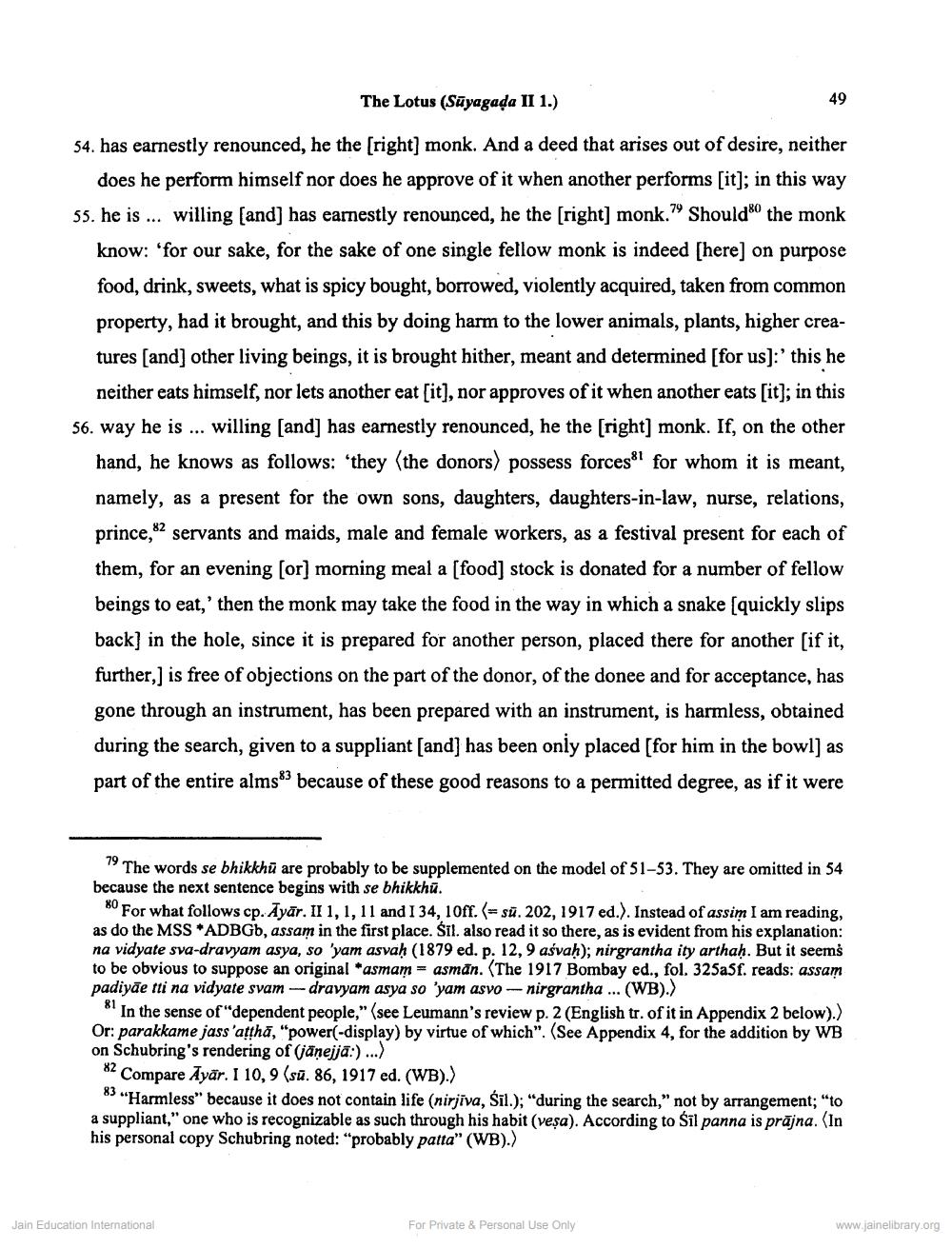________________
The Lotus (Süyagaļa II 1.) 54. has earnestly renounced, he the [right] monk. And a deed that arises out of desire, neither
does he perform himself nor does he approve of it when another performs [it]; in this way 55. he is ... willing (and) has earnestly renounced, he the [right] monk. Should the monk
know: 'for our sake, for the sake of one single fellow monk is indeed [here] on purpose food, drink, sweets, what is spicy bought, borrowed, violently acquired, taken from common property, had it brought, and this by doing harm to the lower animals, plants, higher creatures (and) other living beings, it is brought hither, meant and determined (for us):' this he
neither eats himself, nor lets another eat [it], nor approves of it when another eats [it]; in this 56. way he is ... willing [and] has earnestly renounced, he the [right] monk. If, on the other
hand, he knows as follows: 'they (the donors) possess forces for whom it is meant, namely, as a present for the own sons, daughters, daughters-in-law, nurse, relations, prince, 82 servants and maids, male and female workers, as a festival present for each of them, for an evening (or) morning meal a (food) stock is donated for a number of fellow beings to eat,' then the monk may take the food in the way in which a snake (quickly slips back] in the hole, since it is prepared for another person, placed there for another (if it, further,) is free of objections on the part of the donor, of the donee and for acceptance, has gone through an instrument, has been prepared with an instrument, is harmless, obtained during the search, given to a suppliant (and) has been only placed (for him in the bowl) as part of the entire alms because of these good reasons to a permitted degree, as if it were
The words se bhikkhū are probably to be supplemented on the model of 51-53. They are omitted in 54 because the next sentence begins with se bhikkhu.
30 For what follows cp. Ayār. II 1, 1, 11 and I 34, 10ff. (= sü. 202, 1917 ed.). Instead of assim I am reading, as do the MSS ADBGb, assam in the first place. Šīl. also read it so there, as is evident from his explanation: na vidyate sva-dravyam asya, so 'yam asvah (1879 ed. p. 12, 9 aśvaḥ); nirgrantha ity arthaḥ. But it seems to be obvious to suppose an original asmam = asmān. (The 1917 Bombay ed., fol. 325a5f. reads: assam padiye iti na vidyate svam - dravyam asya so 'yam asvo -- nirgrantha ... (WB).)
In the sense of "dependent people," (see Leumann's review p. 2 (English tr. of it in Appendix 2 below).) Or: parakkame jass 'attha, "power(-display) by virtue of which". (See Appendix 4, for the addition by WB on Schubring's rendering of (jänejjā:) ...) 82 Compare Ayār. I 10,9 (sū. 86, 1917 ed. (WB).)
13 "Harmless" because it does not contain life (nirjiva, śīl.); "during the search," not by arrangement; "to a suppliant," one who is recognizable as such through his habit (veșa). According to Sīl panna is prājna. (In his personal copy Schubring noted: “probably patta" (WB).)
Jain Education International
For Private & Personal Use Only
www.jainelibrary.org




